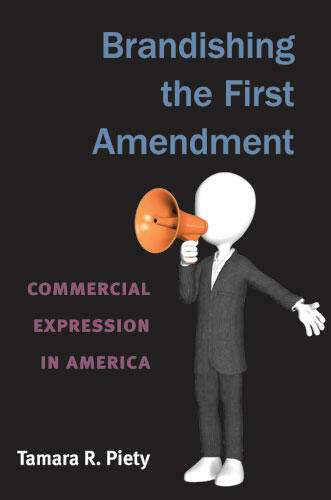Brandishing the First Amendment
Commercial Expression in America
How the First Amendment has been aggressively and inappropriately expanded by commercial entities
Description
Over the past two decades, corporations and other commercial entities have used strategic litigation to win more expansive First Amendment protections for commercial speech—from the regulation of advertising to the role corporate interests play in the political process, most recently debated in the Supreme Court case of Citizens United v. Federal Election Commission. Tamara R. Piety, a nationally known critic of commercial and corporate speech, argues that such an expansion of First Amendment speech rights imperils public health, safety, and welfare; the reliability of commercial and consumer information; the stability of financial markets; and the global environment.
Beginning with an evaluation of commonly evoked philosophical justifications for freedom of expression, Piety determines that, while these are appropriate for the protection of an individual’s rights, they should not be applied too literally to commercial expression because the corporate person is not the moral equivalent of the human person. She then gathers evidence from public relations and marketing, behavioral economics, psychology, and cognitive studies to show how overly permissive extensions of First Amendment protections to commercial expression limit governmental power to address some of the major social, economic, and environmental challenges of our time.
“The timeliness of the topic and the provision of original positions are sure to make the book a valuable contribution that should draw much attention.”
—Kevin W. Saunders, Michigan State University
Tamara R. Piety is Phyllis Hurley Frey Professor of Law at the University of Tulsa College of Law.
Reviews
"Ultimately, Piety sees consumer protection and industrial regulation threatened by the expansion of constitutional protection for free speech in the commercial realm." - J. Brigham, University of Massachusetts Amherst, Choice
"Ultimately, Piety sees consumer protection and industrial regulation threatened by the expansion of constitutional protection for free speech in the commercial realm."
- Choice
—J. Brigham, University of Massachusetts Amherst, Choice
News, Reviews, Interviews
Read: Q&A on Pharmalot blog
Listen: Interview on Fairness Radio (segment begins at 1:18:10)
Listen: Interview on Tulsa Public Radio

